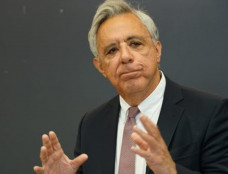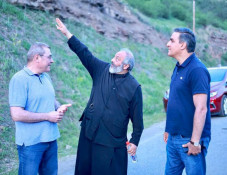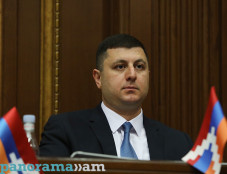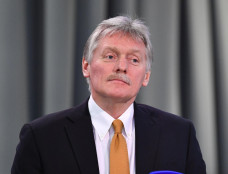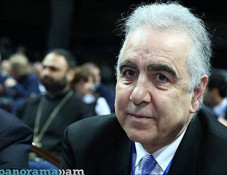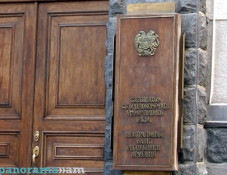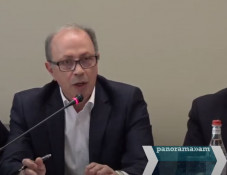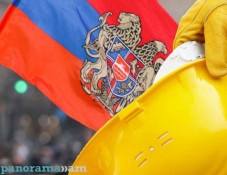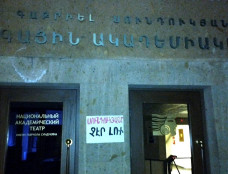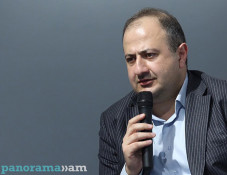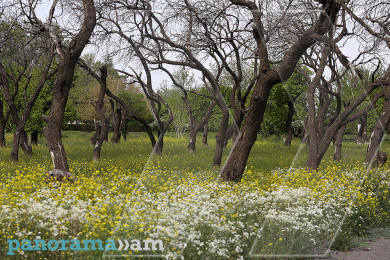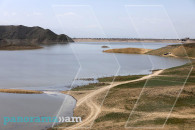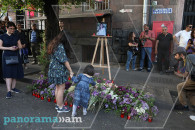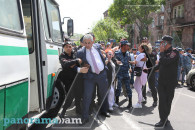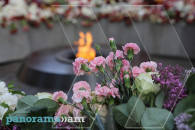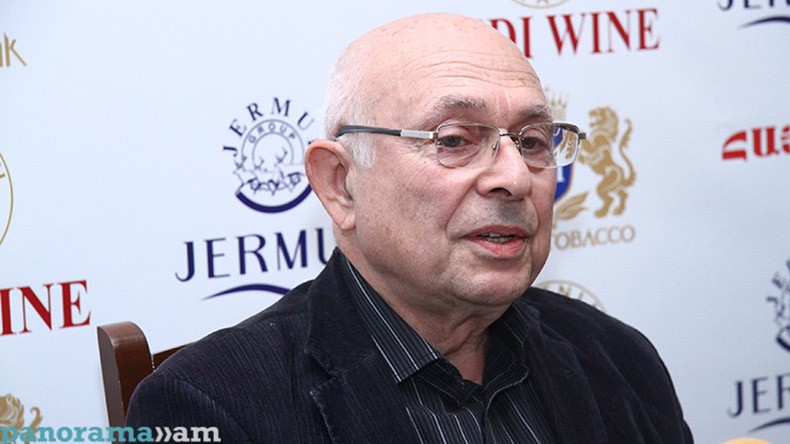
Rouben Galichian: Falsification of Azerbaijan’s history begins from school textbooks and youth believes in that lie
Azerbaijani historiography, represented by Ziya Buniatov, Davud Akhundov and other scientists, began issuing numerous publications, which helped disseminate falsifications, in order to carry out the tasks of legitimising their presence in the region and the legitimacy of their claims on the neighbouring countries and peoples’ heritage. Famous cartographer Rouben Galichian writes about the scheme of these falsifications in his book Historical and Geographical Falsifications of Azerbaijan, a historical, cultural and cartographical research based on a detailed analysis backed by documentary evidence.
According to the author, the falsifications penetrated not only into the ‘scientific publications’ but also into the textbooks. This is where the young generations of Azerbaijan get the first distorted information about the history of their nation, and that of the peoples in the region.
“The author of this research presented this material in an EU Green Party Conference on 22 April 2009, attended by young Azerbaijani diplomats and scientists. Their questions showed that they completely believe in the false history provided to them,” Galichian writes.
Azerbaijani scientists’ numerous publications, which falsify the history, started to be issued back in the Soviet times. ‘Continuing to develop and improve,’ the falsified history has been so strongly rooted in the conscience that the Azerbaijani new generation already perceives it as reality. They are really convinced that the Armenians are ‘unwelcome newcomers’ and that the Christian monuments in Artsakh and Azerbaijan territory are not Armenian, but Albanian, while the Armenians have captured the Albanians’ country and their preserved cultural monuments.
The author notes that S. Rumyantsev and I. Abbasov, Azerbaijani researchers, viewed the issue of the falsifications in the Azerbaijani textbooks in their studies. “The history offered by the authors of the textbooks is a perpetual rivalry with the ‘old enemies.’ If the future generations study from such textbooks, this will be the future awaiting them,” they pointed out.
The Iranian scientists also refer to the problems in the Azerbaijani textbooks. They point out not only falsifications of Iran’s history, but also propagation of anti-Iranian sentiments. Referencing the 5th grade textbook ‘Homeland’ (‘Ata Yurdu,’ 2003), Hussein Ahmadi, an Iranian historian, writes that the government of Iran, its historiography, culture and people are presented in those books as the number one enemies and destroyers of the ‘historical Azerbaijan.’ The book ‘targets’ Armenia and Russia after Iran.
“The whole thing reminds of the version of the history censored by the Central Committee of the Communist Party of the USSR and taught during the Soviet era. Many blindly believed it without questioning its verity,” Galichian writes and compares this practice with the Turkish historiography and textbooks, which also distort the history of the peoples and countries in the region.
Galichian cites a remarkable thesis by Mustafa Kemal Ataturk, ‘the Father of the Turks,’ according to which ‘narration of history is as important as its creation is.’ He cites an excerpt from a Turkish textbook of history for the 6th grade, “The Turks of the Central Asia spread to different parts of the world helping the locals, who still lived in the Stone Age, to embark on the Neolithic Period (approximately 9500 BC). This way, the indigenous people learned from the Turks how to cultivate soil and process metals. The Turks went on with their progress in the newly formed countries. They built big cities and founded mighty states in the Mesopotamia, Anatolia, Syria and around the Aegean Sea, creating centres of civilisation.”
“The Azerbaijani historiographers were probably inspired by their Turkish colleagues’ historical falsifications and continued the borrowed propaganda for the historians of Azerbaijan,” Galichian writes. He notes that Azerbaijan’s historical falsifications also start from school textbooks, where Azerbaijan is presented as a country with ancient history and statehood, on whose territory Armenia was later created.
In a textbook for the 6th grade, Azerbaijan appears as the Sumerians’ contemporary. According to the book, there is written evidence about the tribes of the Ancient Azerbaijan in the Sumerian epics and inscriptions on the cliffs. The same book also presents the thesis that ‘modern Armenia appeared in the territory of Western Azerbaijan.’
According to the author, the methodology of using figments and falsifications was applied in the collection Historical Geography of Azerbaijan (1987) edited by Buniatov.
“The chapters of the book, written by different authors, provide with materials about various epochs of the medieval history of Azerbaijan, while the text itself refers to the history of Albania. In other words, the authors of historical texts start to use the name ‘Azerbaijan’ instead of Albania. The real aim of this practise is to introduce Albania and Azerbaijan as one and the same country. In the second chapter of the book, Azerbaijan is referred to as a country lying on the southern and northern banks of the river Araks,” Galichian writes.
However, one of the authors, Valikhanov, made an inexcusable slip by illustrating his material with a map by Ibn Hawqal, a 10th century Arab geographer. On the map, the territory to the north of Araks is noted as ‘Arran,’ meaning ‘Albania’ in Persian, the territory to the south from Araks is called Azerbaijan, and Armenia is situated beside them. Nevertheless, given that the map keys are in Arabic, almost none of the Azerbaijani readers understand them.
Remarkably, Mammad Amin Rasulzade, one of the founders of the Azerbaijani Republic who played a significant role in choosing its name, wrote in an article titled The Turks of the Caucasus published in Constantinople in 1928 that Azerbaijan and Albania are different countries and nations. “Azerbaijan (Atropatene) and Albania are different in their language and religion. The Azerbaijanis professed Zoroastrianism and adopted Islam after the Arabs’ invasion. The Albanians adopted Christianity in the Middle Ages,” Rasulzade writes.
“This means that naming the newly formed country ‘Azerbaijan,’ as Bartold noted, the authorities pursued only political aims,” Galichian writes. According to all the evidence provided by the historiographers of the Greco-Roman classical era and Middle Ages, Media Atropatene was situated in the region lying to the north of Araks, he adds.
The author notes interesting alterations of the term Albania-Azerbaijan in the study ‘A Historical Survey of Atropatene’ (1989) by academician Igrar Aliyev.
“At the beginning of the book, he calls the region to the south of Araks as Atropatene in accord with the title of the book. In almost all the other pages, however, he uses the name ‘Southern Azerbaijan’ instead of Atropatene, which is completely wrong and improper, but is done on purpose. Moreover, the name ‘Northern Azerbaijan’ can be met in more than four places in the same book. It is how Albania, to the north of Kura, is called, which completely contradicts the geographic knowledge of the epoch. However, it is quite evident that the usage of those made up terms pursues rather clear political and propagandistic aims. The multiple and wide usage of the newly created terms makes them remain in the reader’s memory against their will and can be taken for ‘truth’ after a while. Moreover, the historians, who do not know the history of the region well enough, can reference those studies and names in the future, ‘proving’ to a certain degree that Azerbaijan is an ancient country and that it has southern and northern parts,” Galichian writes.
The task to become ‘Great Azerbaijan’ became so important for the Azerbaijani Republic after it gained independence that attempts have been taken up to introduce the Iranian province Atrpatakan (Atropatene) as ‘Southern Azerbaijan’ and join that region to the country created in 1918 and calling itself ‘Northern Azerbaijan.’ Vasily Bartold, a Russian historian specialising in Oriental studies and Turcology from St Petersburg Academy of Sciences and a member of the Imperial Orthodox Palestine Society, predicted this scheme back in 1926.
To be continued.
Born in Tabriz, Rouben Galichian is a descendant of refugees from Van who survived the Genocide. He received scholarship and studied engineering at Aston University, Birmingham (UK). Since in 1981, he started to study the rich cartographical heritage in the libraries of the UK and other European countries. His first research, Historic Maps of Armenia (in English), was published in 2004. It was a collection of maps from various libraries and museums in the world, where Armenia was noted, beginning from the 6th century to the present times. His second book, Armenia in World Cartography, was published in Yerevan in 2005. The research ‘Countries South of the Caucasus in Medieval Maps. Armenia, Georgia and Azerbaijan’ (in English and Armenian) was published in 2007. The book The Invention of History (in English) was published in 2009.
In his book Historical and Geographical Falsifications of Azerbaijan, published in 2013, the author details the reasons, aims and methodology of the falsification of the history of Azerbaijan and the countries of the region.
Related news
- Historical and Geographical Falsifications of Azerbaijan. Rouben Galichian argues on aims of appropriating others’ history
- Rouben Galichian unmasked falsification of history in Brenda Shaffer’s ‘‘research’’ on Azerbaijan
- MAPPING SPECIALIST COLLECTED LIST OF ANTI-ARMENIAN LITERATURE PUBLISHED IN AZERBAIJAN
Newsfeed
Videos







